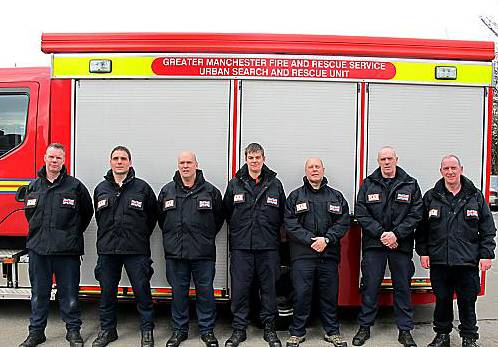Quake team’s grim mission
Reporter: Marina Berry
Date published: 14 March 2011
ROYTON firefighter Peter Stevenson touched down in quake devastated Japan yesterday as team leader of the British Search and Rescue Team.
He is one of seven Greater Manchester Fire and Rescue Service members on a 63-strong team from the UK which has joined the international search for the thousands of people still missing following Friday’s devastating earthquake and tsunami.
Tens of thousands of people are unaccounted for, with the country still on red alert for further earthquakes, aftershocks, tsunamis, and fallout from explosions at a nuclear reactor plant.
British rescuers joined the search for survivors after landing at Haneda Airport in Tokyo.
Mr Stevenson (49), who is stationed at Rochdale, worked in harrowing conditions after Haiti was flattened by an earthquake in January last year.
He was part of the fire service team which rescued a two-year-old girl from the rubble of the capital Port-au-Prince.
Japan is struggling to cope with the catastrophic effects of the disaster and Mr Stevenson said: “I have no doubt this will be an extremely challenging situation, but once again we will be doing our utmost to use our experience, equipment and training to help the people in need.
“A number of the UK team members have recent experience of dealing with the aftermath of the earthquake in Haiti, and previously events in Turkey, Algeria and Pakistan, and I am sure they will utilise everything learned previously.”
Meanwhile, back in the UK, people with relatives and friends in Japan face an anxious wait for news of loved ones.
They include Oldham’s Michelle Huskinson, who made many friends during four years teaching in Japan.
Her mother, Irene Huskinson, of Arnside Avenue, Chadderton, said she was now safely back home, but the family were desperately hoping Michelle’s friends still in Japan were safe.
They include Carmel Arcus, whose parents live in Bolton. She returned to England with Michelle four years ago, but returned to Japan when she couldn’t settle.
Mrs Huskinson told the Chronicle: “We have just had word from Carmel that she is fine but terribly shaken up.”
She is head of English at a school in Tokyo, where buildings shook violently throughout the main earthquake and the wave of aftershocks which followed.
There were reports of casualties in the capital, and
Mrs Huskinson said: “Michelle left a lot of friends there. We are just praying that those closest to her are safe.”
Twice she and her husband, Brian, visited their daughter in Japan, and the mother said: “Both times we had earthquakes measuring more than five on the Richter scale.
“It was very frightening and we do feel for the people out there now.”
The Foreign and Commonwealth Office is advising against all non-essential travel to Tokyo, and sent an eight-strong specialist consular team, including British Red Cross workers, to Japan.
A Foreign Office spokeswoman said it could take days or even weeks to get news of UK nationals who are in Japan.
A special Foreign Office helpline has been set up for UK nationals and their relatives at home. It is 020 7008 0000.
Race to halt third nuclear plant blast
EXPERTS were today battling to prevent a third explosion at the Fukushima Dai–ichi nuclear power plant after another reactor lost its cooling capacity.
A second hydrogen blast in three days rocked Japan’s earthquake–stricken plant earlier today, sending a massive column of smoke into the air and injuring 11 people.
Chief Cabinet Secretary Yukio Edano said one of the workers was seriously injured.
The US said it had shifted its offshore forces away from the plant after detecting low–level radioactive contamination.
The aircraft carrier USS Ronald Reagan was about 100 miles (160km) offshore when it detected the radiation, which US officials said was about the same as one month’s normal exposure to natural background radiation. It was not clear if the radiation had leaked during today’s explosion.
The plant’s operator said radiation levels at the reactor were still within legal limits.
Most Viewed News Stories
- 1The Oldhamers handed awards in King’s New Year’s Honours List
- 2You can score free tickets to a Latics game while supporting Dr Kershaw’s Hospice
- 3Primary school in Uppermill considers introducing new ‘faith-based’ entry criteria to tackle...
- 4Public inquiry announced into rail upgrade that could leave villages ‘cut off’ for months
- 5Tributes paid following death of hugely respected Oldham community figure Dale Harris





